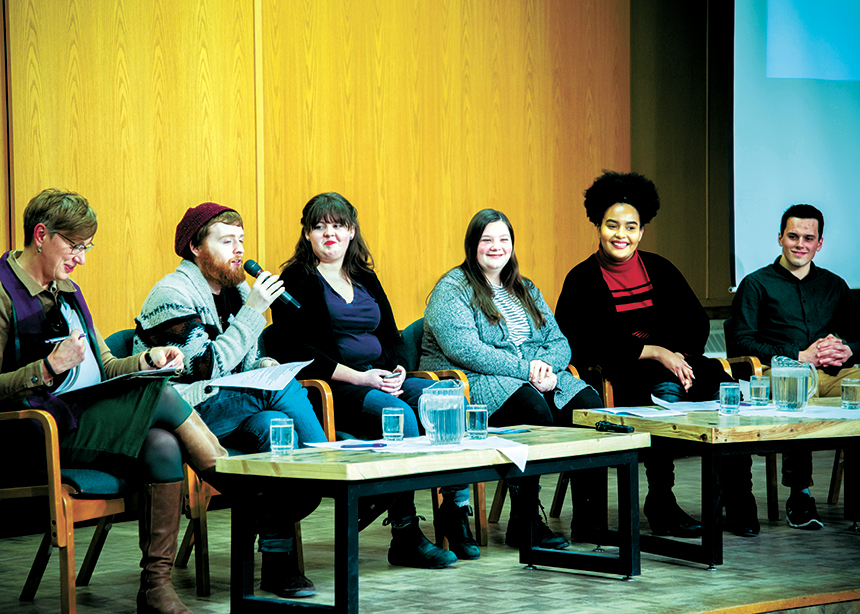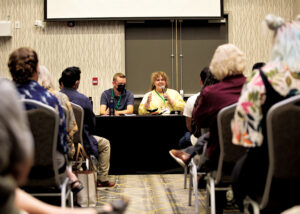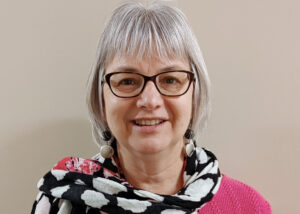Christian youth and young adults are seeking church spaces that are authentic, safe and open, but also supportive of their role in leadership.
At least, that’s what five people who took part in a youth panel had to say at the 2019 Bechtel Lectures at Conrad Grebel University College, Waterloo, Ont., on Feb. 8.
The discussion, “Taking the plunge: Young adults and the church,” was led by Irma Fast Dueck from Canadian Mennonite University in Winnipeg. Fast Dueck is a practical theologian who studies youth and young adult church engagement. (See a report on Irma Fast Dueck’s lecture, “Take me to the waters: Baptism, commitment and the church.”)
The five panellists included members of the local Mennonite and Grebel community. They each said they attend church and are invested in their home communities and Christian groups, bucking the trend that says young adults are losing their faith and leaving organized religion. Still, they’re seeking many of the same things as young people who are leaving the church.
A place to ask tough questions
The panel members all said they wish the church was a safer place to doubt, ask tough questions about their faith, and struggle.
Colin Friesen, 28, is pursuing graduate studies at Grebel and attends Shantz Mennonite Church in Baden. He said he’s generally had good church experiences but wants more than platitudes as responses to his thoughts and fears. “I never found that the church was a good place for tough questions. Despite wanting to talk about those tough questions, it felt like very few people were equipped to talk about [them],” he said.
He said he would often get vague responses like, “Read your Bible more,” and, “Pray about it,” which didn’t answer his questions or help him find resources to gain greater understanding.
Maria Klassen, a Grade 12 student at Rockway Mennonite Collegiate in Kitchener who attends Breslau Mennonite Church, said she’s contemplating baptism. “Right now, I’m at the beginning stages of looking into baptism. I’ve been questioning a lot of things lately, so I’m glad that church has been a place that has kind of sparked ideas and a place I can come to,” she said.
Still, she sometimes feels like she is alone in her questions. “I think we should be more open and authentic, just so we know we’re not the only ones thinking these things,” she said.
Seeking authenticity
In the same vein, the panel members all expressed a desire for the church to be a safe, authentic place, and for church leaders to model that.
According to first-year student Yeabsra Agonfer, she’s looking for a certain church culture. “Being intentional about being vulnerable is something I think is really important in creating a culture where people feel okay with being open with where they’re at in life,” she said.
According to Jonathan Klassen, Maria’s brother, who also attends Breslau Mennonite, authenticity means being honest. “For leaders to admit they make mistakes and aren’t perfect. To be authentic is to be honest and to admit your own faults and where you go wrong,” he said.
Community is important to youth
All the panel members said they have felt frustrated with the church and some have doubted their faith at times, but they recognize the importance of their community of faith.
Friesen, who is a father to a 15-month-old daughter, said he wants to model churchgoing to her. “We want that to be a priority in her life as well, or at least see that it’s a priority for us,” he said. “So we want to raise her in a family where we go to church, and it’s our home. It’s our home away from home.”
Emily Hunsberger, who also attends Shantz Mennonite, said she never realized how much she needed the community. She’s involved with Pastors in Exile, a feminist Bible study, and her church. “What fuels my faith is, I need the community of the church more than I ever thought. I’ve taken it for granted in the past,” she said.
Fast Dueck concluded the conversation by naming that she, a nearly 60-year-old, has many of the same needs in church. “They name something I’m guessing a number of us can identify with, and that we all long for together with the church and hope for together,” she said. “This is not just an issue of this sort of demographic of people. The good thing is, we all have each other.”
Watch the full panel discussion below and read more about the 2019 Bechtel Lectures here.








Leave a Reply
You must be logged in to post a comment.